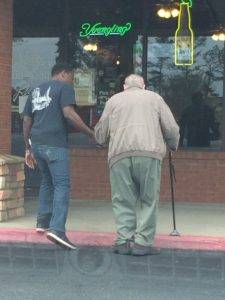Gratitude makes good fruit
Today’s readings are a wake-up call and a form of encouragement. When we are young, we often speak rubbish. But as time moves on we mature and – thanks to the school of “hard-knocks” – our behaviour gets corrected. At least, that’s what used to happen.
However, as I think of our young people, in these present times, with social media, it is, or will be, causing a lot of heartache for them.
The amount of information and the number of “speeches” that people put on Facebook, Twitter, Instagram, etc, is amazing. Young people, especially, put pictures of themselves doing immature things into the world-wide-web and they can rarely be deleted.
Employers are now actively checking the social media information about possible employees. The “sieve” of the social media is quietly destroying future opportunities.
Too often we speak when we are frustrated and we act when we are angry. Or, we do and say things to attract attention to ourselves when we feel “unimportant”.
When we are in public, we often feel “constrained” but when at home, we are less disciplined in our behaviour. That is obvious to many, perhaps, but an important point:
Community helps us be better people. As we reflect on the practical readings for today, we are also challenged to ask ourselves: how do we fill our hearts with good things, as Jesus says: “For a person’s words flow out of what fills his heart.” Our actions likewise come from there.
The 1st Reading gives us a strong clue: “The orchard where a tree grows is judged on the quality of its fruit, similarly a person’s words betray what he feels.” An orchard is a place of community. Community for each person begins with family, then school, then local community, our workplace and finally our national identity.
So, the challenge for us now is this: are we actively part of our communities?
That means: are we contributing as much as we receive from our various communities?
Or are expecting and taking without a thought of the value we contribute?
No community can survive if we do not give: where else will the wealth of a community come from if not from you and I? However, I sense a shift in the world where people have a “sense of entitlement”, and forget our personal obligations.
It can be a difficult topic to discuss with people – young and old. As time changes, more and more people are saying: “the Government” should do this and that. And we forget that “the Government” represents ourselves. They are not some magical corporation sent to serve us.
The Government can only give “what we give”. That is part of our obligation. We can look at it as a burden, or we can look at it as an investment.
How can we develop a healthy sense of our obligations? I believe it is through GRATITUDE. Are we grateful for what we have and what we receive? Perhaps that is why the Responsorial Psalm this week says: Lord, it is good to give thanks to you. This creates a “store” of good.
 As we give thanks to God for what we have, an authentic expression of our “thanks” (Gratitude) will create in us a desire to give back in some way: that is our obligation.
As we give thanks to God for what we have, an authentic expression of our “thanks” (Gratitude) will create in us a desire to give back in some way: that is our obligation.
Not so much as a “pay-back” but a “pay-it-forward”.
There’s an excellent movie with the same name: Pay It Forward.
What are the ways we can pay it forward? When we work, especially, when we don’t enjoy our work, or it is a “dirty job” we sometimes feel “hard done by”. However, having an employer paying us a wage is a great privilege. Technically, we don’t have to do any more than we are paid for. However, when we have a personal problem and need time off, technically the Employer, also, has no obligation to give the time off. But I’m sure, if we give a little more than required, the Employer will be kind to us when we are in need.
It’s easy to give a little extra when our hearts are filled with gratitude, rather than anger and feeling sorry for ourselves. Another example comes from an extended family of a friend.
An Uncle had no children to pass on his farm to. During the years before his death, two nephews used to be employed by him at various times. One nephew always gave extra and never looked at the clock. The other nephew would do as asked and then sit down.
When the Uncle died, he gave the farm entirely to the nephew who gave extra. It was totally unexpected and it shows that when we are generous, blessings will follow. Likewise, when we only do what we have to, blessings will not automatically follow.
May our hearts always be filled with GRATITUDE. Because our speeches and our actions will be life-giving for others. And that can only cause a peace-filled and joyful life for us.
By Gerard Conlan, OMI


